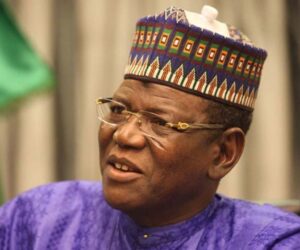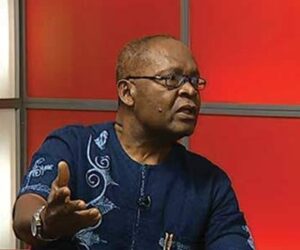Having served the nation for 35 years, the national spokesman of the Nigerian Correctional Service (NCoS), DCC Abubakar Umar, has retired, even as he launched a book stakeholders described as “highly valuable to the Service.
Born in 1970, Umar, who hails from Kogi state joined the Service in 1990 and was successfully pulled out on Wednesday November 19th, 2025.
Speaking Thursday in Abuja at the launch of the book titled:” The Quintessential Correctional Officer”, the Controller General of the NCoS, Sylvester Nwakuche, said the book authored by DCC Umar Abubakar (rtd.), in collaboration with Bashiru Adamu, “is a timely and significant contribution to the ongoing evolution of the Nigerian Correctional Service.
“It goes beyond describing the role of the correctional officer. It probes deeper, questions assumptions, provides context, and ultimately elevates the very idea of correctional practice.
“We operate in a time when expectations from correctional institutions are expanding on multiple fronts — custodial management, non-custodial supervision, security operations, rehabilitation, reintegration, and community collaboration. In such a complex environment, rules alone cannot guide us. What we need — and what this book offers — is a thoughtful philosophy that grounds our work in service, humanity, and professionalism.”
While commending the authors, CG Nwakuche said the Service have always emphasized discipline, humane engagement, integrity, and intelligence-driven operations.
“These are not mere slogans; they are values that define our daily conduct, how we relate with inmates, how we protect society, and how we uphold justice.
“This book captures these values with clarity and purpose. It challenges us to reflect, to grow, and to deepen our understanding of our calling in a world that is changing rapidly.
“I must especially commend DCC Umar Abubakar (rtd.) and Bashiru Adamu for the intellectual effort and courage behind this work. They have shown that correctional officers are not only implementers of policy, but thinkers who can shape national conversations around rehabilitation, security, and public service.
“For Umar Abubakar, this moment carries a very personal significance. Yesterday was his last day in the uniform of the Nigerian Correctional Service. Today, as we unveil this book, he stands before us not just as an author, but as a newly retired officer — a man who dedicated his career to the Service and chose to leave behind a legacy of knowledge.
“There is something profoundly symbolic about that. To exit the Service while gifting it a book that will guide future officers is a gesture of honour, loyalty, and vision.”
Speaking with newsmen, the retired DCC Umar, expressed deep appreciation to the Minister of Interior, who served as the special guest of honour, noting that the Minister’s presence reflected unwavering support for the service and its reform initiatives.
He said the occasion was not merely a book presentation but a moment of reflection, renewal, and recommitment to the values that define the Nigeria Correctional Service.
“This event is more than a routine book launch; it is a moment for us to pause, reflect, and renew our dedication to the ideals that define who we are as a service. It is an opportunity to examine not just what we do, but how we do it and why it matters,” he said.
Umar described the book authored by the immediate past National Population Officer and Deputy Controller of Corrections, Bashir Adama, as a significant intellectual contribution to the ongoing evolution of the correctional system.
He said the publication went beyond outlining the duties of correctional officers, noting that it “moves deeper, questions assumptions, provides context, and ultimately elevates the very idea of correctional practice. “
Highlighting the increasing expectations placed on correctional institutions, Umar noted that modern correctional work now spans custodial management, non-custodial supervision, security operations, rehabilitation, reintegration, and community engagement.
“In such a complex environment, rules alone cannot guide us. What we need—and what this book offers—is a thoughtful philosophy that grounds our work in service, humanity, and professionalism,” he added.
He emphasized that his comments were not intended as a formal review, as another reviewer had been designated, but as an acknowledgment of the depth and relevance of the author’s contribution.
According to him, the service has always upheld the values of discipline, human engagement, integrity, and intelligence-driven operations, describing them as core principles that shape officer conduct, inmate relations, public protection and the pursuit of justice.
Umar commended Bashir Adama for what he called a courageous and intellectually rich effort, praising him for demonstrating that correctional officers are “not only implementers of policy but thinkers who can shape national conversations on rehabilitation.”
He said the publication stood as a legacy work from a committed officer who chose to leave service while gifting it a tool that would help guide future practitioners.
“There is something profoundly symbolic about retiring from the service while gifting it a book that will guide future officers in a culture of honour, loyalty, and vision,” he said.
Umar congratulated the celebrant on what he described as a successful, distinguished and honourable career, wishing him fulfilment and new opportunities as he transitions into civilian life.
He assured that the author’s influence would continue long after retirement, as the book would serve the service for many years.
“As we present this book to the public, I encourage our officers and partners to treat it not merely as a publication, but as a service—a source for training, a reference for practice, and a mirror for self-improvement,” he said.
He urged officers to allow the book to spark meaningful conversations, inspire better conduct, and strengthen the culture of excellence being built across the nation’s correctional institutions.
Umar thanked all guests present for supporting knowledge, reforms and the future of correctional practice in Nigeria, while congratulating the author for what he called a remarkable achievement.








